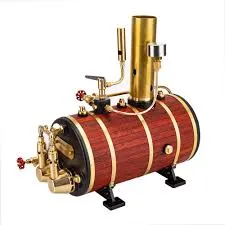
Aug . 02, 2024 14:29 Back to list
Understanding the Key Components and Functions of Steam Boilers in Industrial Applications
Components and Functions of Steam Boilers
Steam boilers are essential appliances in various industrial applications, heating systems, and even some residential setups. They convert water into steam by applying heat energy and rely on various components to perform efficiently and safely. Understanding the components of a steam boiler and their functions is crucial for optimal operation and maintenance.
1. Boiler Shell
The boiler shell is the outer structure of the steam boiler, designed to hold water and steam. It provides a protective casing for the internal components and is typically made of high-quality steel or other materials resistant to heat and pressure. The robust construction ensures durability and safety during operation.
2. Burner
The burner is a critical component that mixes fuel with air and ignites it to produce heat. The type of burner used—whether it’s oil, gas, or a combination of fuels—affects the efficiency and emissions of the boiler. Modern burners are equipped with advanced control systems to optimize the air-fuel mixture, enhancing combustion efficiency and minimizing pollutants.
3. Heat Exchanger
Within the boiler, the heat exchanger facilitates the transfer of heat from the combustion gases to the water. It is designed to maximize the surface area in contact with the water, enabling efficient heat transfer. The heat exchanger's design can vary, with options including fire-tube, water-tube, and cast iron models, each suited to different applications and capacities.
4. Steam drum
The steam drum is a key component in water-tube boilers, where it serves as a reservoir for steam and water. It allows the steam to separate from the water, ensuring a steady supply of high-quality steam. The steam drum also houses various safety and operational equipment such as water level gauges and steam separators, which help maintain ideal operating conditions.
steam boiler components and functions

5. Water Level Gauge
Maintaining the correct water level in a steam boiler is paramount for safe operation. The water level gauge provides a visual indication of the water level within the boiler. It usually employs a glass tube or electronic sensors to display the water level accurately. This component helps prevent situations such as overheating or damage due to low water levels, which could lead to boiler failure.
6. Safety Valves
Safety valves are crucial for ensuring the boiler operates within safe pressure limits. They automatically release excess pressure to prevent explosions or structural failures. These valves are calibrated to specific pressure settings and must be regularly inspected and maintained to ensure their reliability.
7. Control Systems
Modern steam boilers are equipped with sophisticated control systems that monitor and manage various operational parameters, including temperature, pressure, and fuel flow. These systems enable automatic adjustments to optimize performance, enhance safety, and improve fuel efficiency. Advanced controls can also provide remote monitoring and alerts for anomalies, allowing for timely interventions.
8. Pumps
Pumps are integral to maintaining the flow of water to the boiler and circulating steam through the system. They come in various types, including centrifugal and diaphragm pumps, and must be correctly sized to ensure efficient operation. Proper functioning of pumps is vital for maintaining the water level and ensuring adequate steam supply.
Conclusion
In conclusion, understanding the components of a steam boiler and their respective functions is vital for anyone involved in the operation, maintenance, or design of these systems. Each component plays a significant role in ensuring the efficient, safe, and reliable generation of steam. Regular maintenance and monitoring of these components can significantly extend the lifespan of the boiler and improve its performance, making it a central element in many industrial and commercial applications.
-
High-Efficiency Commercial Oil Fired Steam Boiler for Industry
NewsJul.30,2025
-
High-Efficiency Biomass Fired Thermal Oil Boiler Solutions
NewsJul.30,2025
-
High Efficiency Gas Fired Thermal Oil Boiler for Industrial Heating
NewsJul.29,2025
-
High-Efficiency Gas Fired Hot Water Boiler for Sale – Reliable & Affordable
NewsJul.29,2025
-
High Efficiency Biomass Fired Hot Water Boiler for Industrial and Commercial Use
NewsJul.29,2025
-
High-Efficiency Biomass Fired Hot Water Boiler for Industrial Use
NewsJul.28,2025
Related PRODUCTS






















